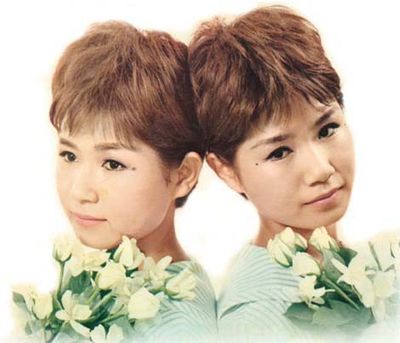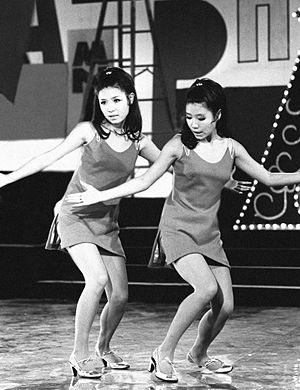Difference between revisions of "The Peanuts"
m |
m (→External Links) |
||
| (4 intermediate revisions by 3 users not shown) | |||
| Line 36: | Line 36: | ||
* [1964.03.xx] [[Peanuts no The Hit Parade = Dai Yon Shuu]] (ピーナッツのザ・ヒット・パレード=第四集) | * [1964.03.xx] [[Peanuts no The Hit Parade = Dai Yon Shuu]] (ピーナッツのザ・ヒット・パレード=第四集) | ||
* [1964.10.01] [[Una Sera Day Tokyo Peanuts no The Hit Parade = Dai Go Shuu]] (ウナ・セラ・ディ東京ピーナッツのザ・ヒット・パレード=第五集) | * [1964.10.01] [[Una Sera Day Tokyo Peanuts no The Hit Parade = Dai Go Shuu]] (ウナ・セラ・ディ東京ピーナッツのザ・ヒット・パレード=第五集) | ||
| − | * [1965.07.xx] [[Amore Sukuzami Peanuts no Hit Parade Roku Shuu]] ( | + | * [1965.07.xx] [[Amore Sukuzami Peanuts no Hit Parade Roku Shuu]] (アモーレ・スクーザミピーナッツのヒット・パレード6集) |
| − | |||
* [1966.05.xx] [[The Peanuts no Hit Parade vol. 6 Yokohama no Tabi]] (ザ・ピーナッツのヒット・パレードvol.6ヨーロッパの旅) | * [1966.05.xx] [[The Peanuts no Hit Parade vol. 6 Yokohama no Tabi]] (ザ・ピーナッツのヒット・パレードvol.6ヨーロッパの旅) | ||
* [1967.12.10] [[The Peanuts Deluxe]] (ザ・ピーナッツ・デラックス) | * [1967.12.10] [[The Peanuts Deluxe]] (ザ・ピーナッツ・デラックス) | ||
| Line 74: | Line 73: | ||
* [1960.10.xx] [[Sayashiko no Yoru]] (清しこの夜) | * [1960.10.xx] [[Sayashiko no Yoru]] (清しこの夜) | ||
* [1960.12.xx] [[Luna Napolitana]] (ルナ・ナポリターナ) | * [1960.12.xx] [[Luna Napolitana]] (ルナ・ナポリターナ) | ||
| − | * [1961.03.xx] [[17sai yo | + | * [1961.03.xx] [[17sai yo Sayonara]] (17歳よさようなら) |
* [1961.05.xx] [[Shiawase ga Ippai]] (しあわせがいっぱい) | * [1961.05.xx] [[Shiawase ga Ippai]] (しあわせがいっぱい) | ||
* [1961.07.xx] [[Infant no Musume]] (インファントの娘) | * [1961.07.xx] [[Infant no Musume]] (インファントの娘) | ||
| Line 117: | Line 116: | ||
* [1966.10.xx] [[Rome no Ame]] (ローマの雨 | * [1966.10.xx] [[Rome no Ame]] (ローマの雨 | ||
* [1967.05.xx] [[Tokyo Blue Rain]] (東京ブルー・レイン) | * [1967.05.xx] [[Tokyo Blue Rain]] (東京ブルー・レイン) | ||
| − | * [1967.08.xx] [[Koi no Fuga]] (恋のフーガ) | + | * [1967.08.xx] [[Koi no Fuga (The Peanuts)|Koi no Fuga]] (恋のフーガ) |
* [1968.02.xx] [[Koi no Ophelia]] (恋のオフェリア) | * [1968.02.xx] [[Koi no Ophelia]] (恋のオフェリア) | ||
* [1968.06.xx] [[Koi no Rondo]] (恋のロンド) | * [1968.06.xx] [[Koi no Rondo]] (恋のロンド) | ||
| Line 141: | Line 140: | ||
* [1975.03.xx] [[Uwaki ni Aitsu]] (浮気なあいつ) | * [1975.03.xx] [[Uwaki ni Aitsu]] (浮気なあいつ) | ||
* [1978.05.xx] [[Mothra no Uta]] (モスラの歌) | * [1978.05.xx] [[Mothra no Uta]] (モスラの歌) | ||
| − | |||
| − | |||
== External Links == | == External Links == | ||
| Line 151: | Line 148: | ||
{{stub}} | {{stub}} | ||
| − | + | {{DEFAULTSORT:Peanuts, The}} | |
| − | [[Category:Groups]] | + | [[Category:Japanese Girl Groups]] |
| + | [[Category:Duets]] | ||
[[Category:J-Pop]] | [[Category:J-Pop]] | ||
[[Category:Disbanded]] | [[Category:Disbanded]] | ||
Latest revision as of 11:22, 1 November 2016
The Peanuts (ザ・ピーナッツ) were a Japanese duo of twins from Aichi, Japan that are often credited with starting the genre of "J-Pop". Their records were very popular in Japan from 1959 to 1975 They have appeared in several films including Mothra and Godzilla, which has been really popular in America. The duo retired from performing in 1975.
Members
Information
After leaving their Aichi high school, twin sisters Ito Emi and Yumi were hired to Watanabe Pro. At this time they were performing as "Ito Sisters" (伊藤シスターズ) at many resturants. They also recieved many voice lessons with Hamamura Jun at the time to prepped them for their singing debut.
The Peanuts debuted in April 1959 with their single "Kawaii Hana" on the television show 2nd Annual Chorus Parade. From June 17th, 1959 to March 31st, 1970, they were regulars on the television show The Hit Parade. The two also acted as the main chairwomen for the variety program Shabondama Holiday from June 4th, 1961 to October 1st, 1972.
The duo became known even outside of Japan for appearing on The Ed Sullivan Show and the variety program Catherina Yekaterina Show in Germany. They made the music genre Japanese pop very popular among the outside world by appearing on these foreign shows.
After considering retirement for three years, the duo finally ended their long-lasting run on February 18th, 1975. On March 31st of that year, the public said their goodbye with a special, "Goodbye Peanuts", on the television show Yoru no Hit Studio. Their final performance was on April 5th of the same year in NHK Hall. Ito Emi would later on marry baseball player for The Tigers Sawada Kenji, have one son, and later divorce him in 1987.
Their songs have been covered by several bands and groups in recent years, including GO!GO!7188 and W.
Discography
Albums
- [1959.11.10] Kawaii Peanuts (可愛いピーナッツ)
- [1960.04.30] Peanuts Minyou Okuni Meguri ( ピーナッツ民謡お国めぐり)
- [1960.12.xx] Peanuts no The Hit Parade (ピーナッツのザ・ヒット・パレード)
- [1961.04.20] Yume de Anata ni ~Peanuts no Popular Mood (夢であなたに~ピーナッツのポピュラームード)
- [1962.01.15] Peanuts no The Hit Parade Dai Ni Shuu (ピーナッツのザ・ヒット・パレード第二集)
- [1962.07.20] Peanuts no The Hit Parade Dai San Shuu (ピーナッツのザ・ヒット・パレード第三集)
- [1963.01.15] Gion Kouta ~Peanuts no Mood Minyou (祇園小唄~ピーナッツのムード民謡)
- [1963.06.xx] Peanuts no Popular Standard ( ピーナッツのポピュラースタンダード)
- [1963.08.20] Vacance da yo, Peanuts ~Peanuts no The Hit Parade Dai Yon Shuu (バカンスだよ、ピーナッツ~ピーナッツのザ・ヒット・パレード第4集)
- [1964.03.xx] Peanuts no The Hit Parade = Dai Yon Shuu (ピーナッツのザ・ヒット・パレード=第四集)
- [1964.10.01] Una Sera Day Tokyo Peanuts no The Hit Parade = Dai Go Shuu (ウナ・セラ・ディ東京ピーナッツのザ・ヒット・パレード=第五集)
- [1965.07.xx] Amore Sukuzami Peanuts no Hit Parade Roku Shuu (アモーレ・スクーザミピーナッツのヒット・パレード6集)
- [1966.05.xx] The Peanuts no Hit Parade vol. 6 Yokohama no Tabi (ザ・ピーナッツのヒット・パレードvol.6ヨーロッパの旅)
- [1967.12.10] The Peanuts Deluxe (ザ・ピーナッツ・デラックス)
- [1968.12.01] Peanuts Golden Deluxe (ピーナッツ・ゴールデンデラックス)
- [1970.07.20] Feeling Get ~The Peanuts no Atarashii Sekai (フィーリン・グッド~ザ・ピーナッツの新しい世界)
- [1971.02.20] The Peanuts Double Deluxe (ザ・ピーナッツ・ダブル・デラックス)
- [1971.07.10] The Peanuts Best Album (ザ・ピーナッツ・ベスト・アルバム)
- [1972.04.10] Sekai no Onnatachi (世界の女たち)
- [1972.10.25] SUPER DISCO 20 Series The Peanuts Best 20 (SUPER DISC 20 シリーズザ・ピーナッツ・ベスト20}
- [1972.12.05] The Peanuts On Stage (ザ・ピーナッツ・オン・ステージ)
- [1973.06.10] The Peanuts Best 20 "Yubiwa no Ato ni" kara "Kawai Hana" made ( ザ・ピーナッツ・ベスト20「指輪のあとに」から「可愛い花」まで)
- [1973.08.25] Jounetsu no Sahaku ~Just Now The Peanuts (情熱の砂漠~ジャスト・ナウ・ザ・ピーナッツ)
- [1974.02.10] Ki ni Naru Uwasa / Best Of The Peanuts (気になる噂/ベスト・オブ・ザ・ピーナッツ)
- [1974.10.25] The Peanuts Best 20 (ザ・ピーナッツ・ベスト20)
- [1975.05.10] Fumetsu no The Peanuts (不滅のザ・ピーナッツ)
- [1976.12.05] Big Star Series The Peanuts (ビッグ・スター・シリーズザ・ピーナッツ)
- [1977.11.21] Big Star W Series The Peanuts ( ビッグ・スター・W・シリーズ ザ・ピーナッツ)
- [1978.10.05] The Peanuts Original (ザ・ピーナッツ・オリジナル)
- [1978.10.05] The Peanuts Pops (ザ・ピーナッツ・ポップス)
- [1978.10.05] The Peanuts Love (ザ・ピーナッツ・ラブ)
- [1979.03.15] Best Star Double Tracks The Peanuts (ベスト・スター・ダブル・デラックス ザ・ピーナッツ)
- [1979.10.21] Super Star Best Album The Peanuts ( スーパースター・ベスト・アルバム ザ・ピーナッツ)
- [1980.03.05] Monument The Peanuts Last Live (モニュメントザ・ピーナッツ・ラスト・ライヴ)
- [1984.11.21] Fukkoku Ban The Peanuts On Stage (復刻盤 ザ・ピーナッツ・オン・ステージ)
Singles
- [1959.04.xx] Kawaii Hana (可愛い花)
- [1959.06.xx] Kisasu Kisasu ( キサス・キサス)
- [1959.09.xx] Jounetsu no Hana (情熱の花)
- [1960.02.xx] Otome no Inori (乙女の祈り)
- [1960.04.xx] Kanashiki 16sai (悲しき16才)
- [1960.07.xx] Getsuei no Napoli (月影のナポリ)
- [1960.10.xx] Papa wa Mama ni Ikareteru ( パパはママにイカレてる)
- [1960.10.xx] Jingle Bell (ジングル・ベル)
- [1960.10.xx] Sayashiko no Yoru (清しこの夜)
- [1960.12.xx] Luna Napolitana (ルナ・ナポリターナ)
- [1961.03.xx] 17sai yo Sayonara (17歳よさようなら)
- [1961.05.xx] Shiawase ga Ippai (しあわせがいっぱい)
- [1961.07.xx] Infant no Musume (インファントの娘)
- [1961.08.xx] Saku Saku (スク・スク)
- [1961.08.xx] Imaike Ondo (今池音頭)
- [1961.08.xx] Are wa 15 no Natsumatsuri (あれは15の夏祭り)
- [1961.09.xx] Pepito (ペピト)
- [1962.01.xx] Coffee Rumba (コーヒー・ルンバ)
- [1962.01.xx] Yellow Bird (イエロー・バード)
- [1962.03.xx] Itsumo Kokoro ni Taiyou wo (いつも心に太陽を)
- [1962.03.xx] Furimukanaide (ふりむかないで)
- [1962.04.xx] Kimi Sarishi Yoru (君去りし夜)
- [1962.05.xx] Yuuyake no Trumpet (夕焼けのトランペット)
- [1962.06.xx] Watashi to Watashi (私と私)
- [1962.07.xx] Moscow no Yori wa Fukete (モスコーの夜は更けて)
- [1962.08.xx] Iesusarii (イエスサリー)
- [1962.09.xx] Saihate no Bajou (さいはての慕情)
- [1962.12.xx] Teami no Kutsushita (手編みの靴下)
- [1982.12.xx] Lemon no Kiss (レモンのキッス)
- [1963.01.xx] Wakai Kisetsu (若い季節)
- [1963.01.xx] Gion Kouta (祇園小唄)
- [1963.03.xx] Yogiri ni Naku Blues (夜霧に泣くブルース)
- [1983.04.xx] Koi no Vacance (恋のバカンス)
- [1963.05.xx] Maikohan Ondo (舞妓はん音頭)
- [1963.11.xx] Tokyo Tasogare (東京たそがれ)
- [1964.01.xx] Kanashiki Kangaroo (悲しきカンガルー)
- [1964.04.xx] Candy Moon (キャンディームーン)
- [1964.05.xx] June Bride (ジューン・ブライド)
- [1964.09.xx] Aozora no Egao (青空の笑顔)
- [1964.09.xx] Una Sera Day Tokyo (ウナ・セラ・ディ東京)
- [1964.09.xx] Akai Daiya (赤いダイヤ)
- [1964.11.xx] My Love (マイ・ラブ)
- [1965.01.xx] Futari no Koibito wa? (二人の恋人は?; German Release)
- [1965.01.xx] Souvenir Tokyo (スーヴェニール・東京; German Release)
- [1965.03.xx] Futari no Koibito wa? (二人の恋人は?)
- [1965.03.xx] Kaeshite Okure Ima Sugu ni (かえしておくれ今すぐに)
- [1965.07.xx] Anata no Mune ni (あなたの胸に)
- [1965.08.xx] Kawaii Kotori (かわいい小鳥)
- [1965.12.xx] Otome no Namida (乙女の涙)
- [1966.05.xx] Ai wa Eien ni (愛は永遠に)
- [1966.08.xx] Sugar Candy (シュガー・キャンディー)
- [1966.10.xx] Rome no Ame (ローマの雨
- [1967.05.xx] Tokyo Blue Rain (東京ブルー・レイン)
- [1967.08.xx] Koi no Fuga (恋のフーガ)
- [1968.02.xx] Koi no Ophelia (恋のオフェリア)
- [1968.06.xx] Koi no Rondo (恋のロンド)
- [1968.09.xx] Glass no Shiro (ガラスの城)
- [1969.03.xx] Kanashiki Tango (悲しきタンゴ)
- [1969.07.xx] Aishuu no Valentino (哀愁のヴァレンティーノ)
- [1969.09.xx] No Ichigo Tsumande (野いちご摘んで)
- [1970.03.xx] Otoko to Onna no Sekai (男と女の世界)
- [1970.07.xx] Tokyo no Onna (東京の女)
- [1970.12.xx] Osaka no Onna (大阪の女)
- [1971.02.xx] Kawaii Hana (可愛い花; Re-issue)
- [1971.02.xx] Jounetsu no Hana (情熱の花; Re-issue)
- [1971.02.xx] Getsuei no Napoli (月影のナポリ; Re-issue)
- [1971.05.xx] Nan no Kinashi ni (なんの気なしに)
- [1971.10.xx] San Francisco no Onna (サンフランシスコの女)
- [1972.03.xx] Rio no Onna (リオの女)
- [1972.09.xx] Sayonara wa Totsuzen ni (さよならは突然に)
- [1973.02.xx] Yubiwa no Ato ni (指輪のあとに)
- [1973.07.xx] Jounetsu no Sabaku (情熱の砂漠)
- [1974.01.xx] Ki ni Naru Uwasa (気になる噂)
- [1974.04.xx] Ai no Yukue (愛のゆくえ)
- [1974.04.xx] Owakare Desu Anata (お別れですあなた)
- [1975.03.xx] Uwaki ni Aitsu (浮気なあいつ)
- [1978.05.xx] Mothra no Uta (モスラの歌)
External Links
This article is a stub. You can help generasia by expanding it.

